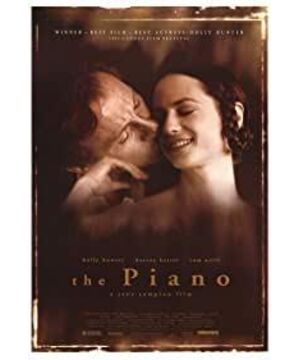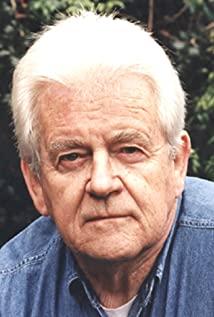01
Although I don't buy it when it is dubbed "feminism" and "women's growth", I have to admit that this is a magical movie.
Movie suspense master Hitchcock once said that a genteel British female teacher in a taxi will suddenly unbutton your pants, which is typical suspense.
Then the biggest suspense of the play is, "A woman who is so weak, looks so pale, but has the same passion as fire, is as tough as an oak tree, and hides such a cruel soul under such an ordinary appearance."
It's the heroine of the movie.
A film reviewer wrote that the heroine "although she doesn't have a single line, she is full of passion and expressive enough to be almost equivalent to shouting."
With its excellent performance, the film and "Farewell My Concubine" tied for the Palme d'Or at Cannes, and the actress who played the heroine took home the Oscar.
02
"The voice you hear is not the voice of my words, but the voice of my thoughts. I haven't spoken since I was six years old."
The story begins with the narration of the heroine, --- I feel a lot more at ease, the ending is not death, and I don't have to be afraid of how it goes, --- In fact, it is a big reunion.
Although the process is depressing.
At the beginning, it was an empty and silent beach, scattered luggage, and the heroine's black dress. The whole picture was a helpless one.
With her 6-year-old daughter, she was married by her father to an unknown man on a New Zealand island. He came from far and wide, but there was no misery and fatigue on his face. Sitting on the suitcase, holding a parasol, waiting for her husband to pick them up home, is like a vacation.
She is dumb.
She suddenly lost her voice when she was 6 years old, but her calmness is not due to her physical disability, but she has something that makes her happy no matter what the situation is, the piano. Through the gap, put your hand into the wooden shelf of the piano, even if it is only a few simple notes, it is the best elixir.
However, the husband refused to carry the piano away.
She protested, to no avail.
Protest again, invalid.
Eventually they were gone, and the piano was left alone on the beach.
03
If her husband had understood the meaning of the piano to her earlier, he would not have made this mistake, and the story behind it would not have happened. However, no if, from that moment on, he was sentenced in her heart.
(It's strange, isn't the high value of the piano enough to impress this thrifty housekeeper to move it back?)
Maybe you want to say, just a piano, as for?
For ordinary people, it really isn't. But for the heroine of the serious literary youth, the piano is not only the piano, but the only way for her to connect with the world.
She is speechless, and the sound of the piano is her sound generator.
She is alienated from the crowd, the piano is her shelter, her Eden, Lele alone, just fulfills her stubbornness of being independent from the world.
I even feel that in her heart, her daughter is an independent individual, but the piano is an inseparable part of her life.
The sound of the piano is like a complaint, and the flow is flowing. Beneath her stern and silent face, there was a desire similar to pleading lurking.
Unfortunately, this emotional need, which is different from that of ordinary secular women, has been missed by husbands for a long time.
Under the circumstance that the two were separated due to Qin's heart, the neighbors "passively" "take advantage of the situation".
04
The heroine has the pride of a British aristocrat, but the piano is left on the beach, and she is restless. Finally one day, she lifted her umbrella-like skirt, stepped on the slippery muddy road, and knocked on her neighbor's door.
This was the first time she had to take the initiative to communicate with the outside world for the sake of the piano.
Perhaps it was this posture that made the neighbors wonder why the piano had such a magic power for her, and he took them to the beach where they came.
In the grayness of the sky and water, the piano is striking.
The mother and daughter were overjoyed when they saw the piano.
In an instant, the heroine's face was as if the ice and snow had just melted in the spring, and the daughter danced to the rhythm and turned up somersaults.
Neighbors stood by, just watching.
A kind of emotion that has never been seen before is smouldering, and it is outrageous.
Like the virgin jungle they live in, the neighbors with tattoos on their faces are rough, savage, vigorous, and naturally light-oriented. The heroine is that light.
He seemed to understand, but he faintly sensed the heroine's heart through the sound of the piano, ---- proud and lonely.
He commanded people to carry the piano on the rough and muddy path, still silent, but this silent firmness, isn't it gentle comfort to the heroine?
05
Speaking of which, I have to say that my husband is actually not a scumbag.
Before discovering that his wife was cheating, he tried several times to get closer to each other. But the behavior of abandoning the piano at the beginning has made the heroine have a prejudice, and with his various efforts, it is to no avail, but it is getting farther and farther. At the same time, the neighbor moved back to the piano. The heroine who has a piano has a piano to play, and is immersed in the music world. He neither intends to be a good wife nor manage a marriage, but also turns a deaf ear to his various efforts.
Ironically, after experiencing betrayal and making the crazy act of cutting off her fingers, looking at the sleeping heroine, he heard her voice instead, so he chose to fulfill. It's not a mind that any man has.
But when the two are together, he always ignores the heroine's needs and only cares about land and property. Although there is no bread, love can't last long, but for a literary girl, her focus is always not. When it comes to bread, I can't appreciate my husband's hard work and housekeeping like ordinary people.
Both of them are right, but their concerns are so different that they are destined to go farther and farther. Does this look like many marriages in life?
The neighbors have been keen to hold the heroine's life from the beginning.
06
He exchanged 80 acres of land with his husband for the piano, with the condition that he asked for the matriarch. But his real purpose is not to learn the piano, nor is it as simple as helping her bring the piano back.
When she played the piano, he asked for some movements to exchange several keys. From looking at her from a distance, to asking to take off her coat, to touching her hand, to lying in her clothes...
The heroine turned out to be, all, endure!
She is such a proud person! At first, her husband asked him to teach the piano, but she was against it, thinking that people like the neighbors were illiterate and rude.
Now, when playing the piano, her slender hands are touched arbitrarily by him. Her biggest resistance is that the bargaining requirement is added to "5 keys!"
Seeing this, I don't feel erotic, but tragic.
The piano gave her the greatest spiritual nourishment and gave her a closed and self-sufficient world. To this end, she always insisted, even if she endured the "obscenity" of a man she despised.
Later, the uncomfortable interaction came to an abrupt end. He confessed that he did all this in order to "make you care about me", feeling unbearable, and gave Qin to her for free.
And when she could play the piano at home, she found that she was used to his "issue instructions" and "harassment"... Does it seem like she fell in love with the trick of seducing a rape?
The seemingly vulgar love through exchange looks incredible, but it actually happened, and the slowly deepening entanglement of the flesh perfectly sets off a love story like weeping.
07
The heroine and neighbors, from the first time they "had no choice but to actively seek help", to being forced to undress, being touched, and then to the breeding of love, it seems absurd, but in fact there is an inner logic.
At the end of the story, when they were leaving, the heroine voluntarily threw away the piano and experienced death, but finally survived and began to practice speaking.
There is no doubt that it was the power of love that made her bravely abandon her usual way of interaction, walk out of independence, isolation and tension, and move towards warmth and relaxation.
It can be seen that her almost paranoid love for the piano is related to her artistic preference and more emotional sustenance.
When there is something that can make her feel more happy than the piano, such as love, she is also willing to come out of the shelter of the piano and try other connection methods.
Her husband originally had an innate advantage, but he failed to meet her preferences and hated the piano, so he was also hated by her.
The neighbor is a disgraceful cheating object. Although the method is debatable, it actually conforms to her paranoia and further stimulates her desire, thereby capturing her heart.
08
My emotional brain loves this ending. The husband is generous, the lover is loyal, and the entanglement of the three is sublimated into the new life of the three.
But my rational brain told me that the heroine's extramarital affair is neither a wise move nor "feminist".
When she and her daughter came to the island, apart from each other and a pile of luggage, they had no relatives or friends, no property status, and no skills to support themselves. Everything had to rely on her husband for security.
As a result, the heroine faces up to her own desires and desires, and puts it into action boldly. Is it really worthy of encouragement?
I even thought that if the husbands were impulsive and started killing, how could they fight back?
In the movie, her daughter persuaded her to pull back from the precipice, and her husband still trusted her after witnessing their fornication. What about her? Still using the piano keys to show love, and what's even more bizarre is that she asked her daughter to send her a gift of love, which resulted in her fingers being chopped off. If it is a person, he can burn with passion, but now his clever and cute daughter is almost in danger, how innocent her daughter is!
The only thing worth envy is her luck, because looking at the classics of the same type, there are few that are not tragic.
"Anna Karenina", lying on the track. "Paradise Lost", both committed suicide by taking poison. Madame Bovary, taking poison. "Covered Bridge's Last Dreams" is considered mild, each going back to his own home and caring for his whole life...
Seeing the sweetness and happiness of the heroine and the neighbor, I unkindly pushed the camera forward. One day, the neighbor no longer loves her as before, will she play the piano again?
After all, her first husband knew her better than her neighbors—"I didn't have to talk to him. I could put what I wanted into his mind, as if there was a piece of paper written there.", but then, " Because he started to get scared and stopped listening to me." He didn't end well.
This kind of perfect ending based on the fulfillment and loyalty of others is really unfeminine.
Isn't the so-called feminism based on the ability and willingness to live well without relying on others?
09
It really becomes boring when people get older. It is difficult for me to be like a young man, only seeing the beauty of love and ignoring the dangers behind it.
The director of the film also said, "The piano is a stark contrast to the life of the Aboriginal people in New Zealand. The romantic passion is in our lives, and sometimes we live for it. Although I believe it is not a completely wise life. method, and knowing that its consequences are often dangerous, but I will still cherish it and believe it is a symbol of great courage. ”
How to make a safe and harmless life full of romantic passion may be more worthy of our thinking and practice.
View more about The Piano reviews











